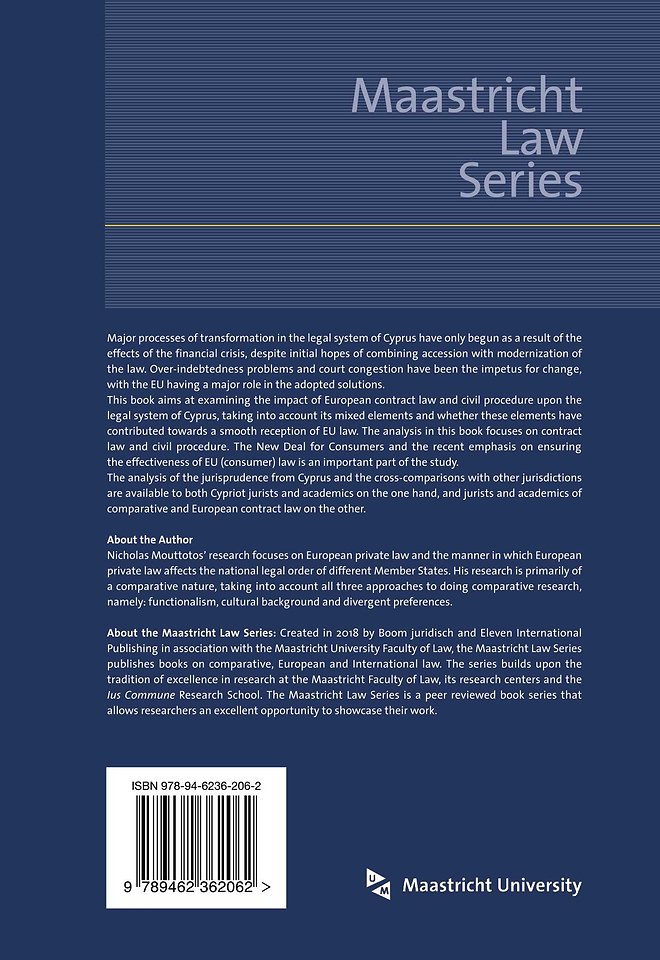The Impact of Europeanization in Cyprus Contract Law and the Spill-Over to Matters of Civil Procedure
More Pieces on the Mosaic?
Paperback Engels 2021 1e druk 9789462362062Samenvatting
Major processes of transformation in the legal system of Cyprus have only begun as a result of the effects of the financial crisis, despite initial hopes of combining accession with modernization of the law. Over-indebtedness problems and court congestion have been the impetus for change, with the EU having a major role in the adopted solutions.
This book aims at examining the impact of European contract law and civil procedure upon the legal system of Cyprus, taking into account its mixed elements and whether these elements have contributed towards a smooth reception of EU law. The analysis in this book focuses on contract law and civil procedure. The New Deal for Consumers and the recent emphasis on ensuring the effectiveness of EU (consumer) law is an important part of the study.
The analysis of the jurisprudence from Cyprus and the cross-comparisons with other jurisdictions are available to both Cypriot jurists and academics on the one hand, and jurists and academics of comparative and European contract law on the other.
Trefwoorden
Specificaties
Lezersrecensies
Inhoudsopgave
1 Introduction 1
Part I Approximation from Theory
2 The Legal System of Cyprus as a Mixed Legal System 15
2.1 Introduction 15
2.2 The Idea of Legal Classification 16
2.3 Mixed Legal Systems 21
2.3.1 The ‘Classical Mixed Jurisdictions’ and the Similarities with Cyprus 22
2.4 Historical Overview 27
2.4.1 A British Colony 30
2.4.2 Independence 33
2.4.3 Elements of a Potential Solution: Bizonal Bicommunal Federation 36
2.5 The Cyprus Economy 41
2.6 The Legal System 43
2.6.1 Procedural Law 47
2.6.2 The Judiciary 49
2.6.2.1 The Supreme Court as a ‘Supercourt’ 50
2.6.3 Contract Law 53
2.6.3.1 The Importance of the English Common Law for the Development of Contract Law in Cyprus 55
2.6.3.2 Legal Doctrine in Cyprus 57
2.6.3.3 Commercial Law Follows the Dominant Economy 57
2.6.3.4 Stare Decisis and Legal Reasoning 60
2.7 Accession to the EU and the Challenges 62
2.7.1 The Decreasing Transposition Deficit 64
2.7.2 The Tension between Common Law and European Law in the Realm of Contract Law 65
2.7.3 The Tension between EU Law and the Common Law in the Realm of Civil Procedure 68
2.8 Conclusions 70
3 Comparative Law and Economics 73
3.1 Introduction 73
3.2 Convergence as a Movement Towards Efficiency - the Competitive Process 76
3.2.1 Doctrine vs Discretion and Judicial Adaptability 79
3.2.2 The Interpretation of Contracts 80
3.3 Institutional Competition and Private Law 82
3.3.1 The Legal Origins Thesis 83
3.3.2 The Importance of Institutional Infrastructure 86
3.4 Competition between Legal Systems, the LOT and Contract Theory 91
3.4.1 The Relation between Formal Contract Law and Enforcement 94
3.5 LOT and European Law 95
3.6 Procedural Law 99
3.7 The Impact of Brexit on Regulatory and Judicial Competition 101
3.8 Conclusion 103
4 Contract Law in the Aftermath of the Financial Crisis 107
4.1 Introduction 107
4.2 The Important Role of National Courts in the EU Following the Financial Crisis 109
4.3 Cyprus Law 111
4.3.1 Contractual Interpretation under Cyprus Law and English Caselaw 112
4.3.1.1 The Shift toward a More Flexible Approach to Issues of Contractual Interpretation 113
4.3.1.2 The Importance of Textual Interpretation in Cyprus Law and the State of Flux in English Law 115
4.4 Consent and Standard Form Contracts 117
4.5 Security and Stability in Transactions vs Equity and Restorative Contractual Justice 118
4.5.1 Rectification under the Common Law 121
4.6 Good Faith as a General Principle of EU Law 122
4.7 Good Faith under the Common Law 126
4.8 Good Faith under Cyprus Law 130
4.8.1 Article 288 of the Greek Civil Code 132
4.9 The Battle between the Ethic of Self-Interest and Self-Reliance 133
4.9.1 EU law as a Tool for Contract Modification 135
4.9.2 Rebus sic standibus as a Solution to the Subprime Crisis 136
4.10 Conclusions 142
Part II Approximation from Practice
5 The Impact of European Law on Contract Law in Cyprus 147
5.1 Introduction – The Cyprus Crisis 147
5.2 The Legal Framework for Private Debt Restructuring in Cyprus 150
5.2.1 Interpreting the Terms of the Contract – Foreign Currency Loans 155
5.2.1.1 The Approach of Cypriot Courts in Relation to the RiskAssociatedwith ForeignCurrency Denominated Loans 156
5.2.1.2 TheApproach of Greek Courtsin Relation to the Risk Associated with Foreign Currency Denominated Loans 157
5.2.1.3 The Contrast in the Evidentiary Basis Used by the Courts in Cyprus and the Courts in Greece 159
5.3 Public vs Private Banking Laws 164
5.3.1 Banking Law in Cyprus 167
5.3.2 The Intrusion of Financial Regulatory Standardsin Traditional Contract Law 169
5.4 Contract Law – The Sui Generis Banker-Customer Relationship and the Emerging Risks 171
5.4.1 The Importance of Credit Risk – Information Obligations as a Mechanism for Shifting the Risk to the Creditor 172
5.5 Liability of Financial Institutions for Mis-Selling Practices 174
5.5.1 Fiduciary Law 175
5.5.1.1 The Approach of Cypriot Courts towards Emerging Duties of Care 177
5.5.1.2 The Recognition of Certain Duties of Care in the English Common Law – The Distinction between Mere Provision of Information and Advice 181
5.5.1.3 The Failure to Recognize Information Duties under Cyprus Law 183
5.5.2 Common Law Duty toAdvise or Warn –Actionsfor Negligent Misstatement 185
5.5.3 Duty of Care 187
5.5.3.1 Duty of Care under Greek Law 189
5.5.3.2 The Definition of Consumer under European Law – Does the Level of Knowledge of the Customer Play any Role in the Status as a Consumer? 192
5.6 Shifting the Risk from Debtors to Creditors -The Impact of MiFID 195
5.6.1 The Approach of Cypriot Courts 198
5.6.1.1 The Role of the State in Protecting Weaker Parties 201
5.7 Legislative Control of Fairness 204
5.7.1 The Breakdown of Relationship Banking 204
5.7.2 Consumer Protection under Cyprus Law 206
5.7.2.1 The Beginnings of Consumer Protection in Cyprus 207
5.7.2.2 Relaxation of the Burden of Proof 208
5.7.2.3 The Role of General Principles of Private Law in Protecting the Consumer – Consumer Protection still in Its Infancy 210
5.7.2.4 The Protection of Weaker Parties in Continental Systems – Going beyond B2C Transactions 211
5.7.3 Directive on Unfair Terms in Consumer Contracts 213
5.7.3.1 Two Core Requirements for Establishing Unfairness 216
5.7.3.2 Terms Describing the Main Subject Matter of the Contract 219
5.7.4 Directive 93/13 before Cypriot Courts 224
5.7.4.1 The Unfairness of Arbitration Clauses – Cyprus vs European Approaches 227
5.7.4.2 A Shift in the Application of Law 93(I)/96 after the Financial Crisis 231
5.7.5 Unfair Commercial Practices Directive 237
5.7.5.1 The Development ofthe LawonCommercial Practices by the CJEU 239
5.7.6 Consumer Credit Directive 241
5.7.7 Mortgage Credit Directive 243
5.7.8 The Interplay between Directive 93/13 and the OtherConsumer Protection Directives 245
5.8 The Changing Landscape: Public Enforcement of EU Law 246
5.8.1 The Office of the Financial Ombudsman 247
5.8.2 The Director of the Competition and Consumer Protection Service 250
5.9 Proposals and Recommendations to Increase the Effectiveness of the Directives 257
5.10 Conclusions 261
6 Procedural Law as a Tool Towards Changing the Law 267
6.1 Introduction 267
6.2 The Civil Procedure Rules 269
6.3 The Judicial System and Economic Development 272
6.3.1 Enforcing Contracts 275
6.3.2 The Efficiency of Civil Justice Systems 277
6.3.2.1 The Influence of theComparative Data on Procedural Reforms and the Role of EU Institutions 283
6.4 The Common Law/Civil Law Efficiency Divide 284
6.4.1 The Adversarial vs the Inquisitorial System 285
6.4.1.1 Convergence between the Two Systems 290
6.4.2 The Role of the Judge as a Passive Arbiter of a Dispute 292
6.4.3 Responsibility of Counsels to Bring Cases with Reasonable Prospects of Success (Meritorious Cases) 295
6.5 The Necessity for Reform 297
6.5.1 New Developments 299
6.5.1.1 Case Management 303
6.5.1.2 Training of Judges 308
6.5.1.3 Specialized Courts 309
6.5.1.4 Court Automation 313
6.6 Enforcement and the Impact of EU Law 316
6.6.1 Effective Enforcement as a Principle of EU Law 318
6.6.1.1 The Ex Officio Examination of Unfair Terms 320
6.6.1.2 The Repercussions of the Ex Officio Doctrine on National Systems of Civil Procedure 322
6.6.2 Alternative Dispute Resolution 327
6.6.3 The Importance of Privatization of Adjudication as a Method to Dismantle the Monopoly of the Law 329
6.6.4 Consumer ADR 331
6.6.5 Collective Redress Mechanisms 334
6.6.6 Mechanisms for Consumer Collective Redress in Cyprus 336
6.6.7 The Role of Administrative Authorities Empowered under EU Law 337
6.6.7.1 The Director of the Consumer Protection Service and the Enforceability of Its Decisions 339
6.7 New Deal for Consumers 342
6.8 Civil Procedure as a Tool for Achieving the Regulatory Goals of Substantive Law 345
6.9 Conclusions 347
7 Conclusions 351
7.1 The Coherence of Private Law and the Autonomous Character of EU Law 352
7.1.1 The Fragmented Plurality of Norms and the Divergent Implementation of EU Law 354
7.2 The Impact of Europeanization on Civil Procedure 356
7.2.1 The Procedural Law Reform 357
7.2.2 The Influence of the LOT 359
7.3 Insights from the Implementation of EU Law in a Mixed Jurisdiction 360
7.3.1 The Reception of European Law in Cyprus 361
7.4 The Impact of EU Law – Conclusions from this Study 362
7.4.1 The Influence of Directive 93/13 on National Contract Law 363
7.4.1.1 The Unwillingness to Rewrite Contracts and the Recent Shift in the Application of Consumer Protection Legislation 364
7.5 Areas of Future Research 366
7.5.1 The Introduction of Individual Remedies 366
7.5.2 The Introduction of Collective Redress Mechanisms 367
7.5.3 The Role of the Financial Ombudsman in Insolvency
Proceedings 367
List of References 369
List of Cases 427
Anderen die dit boek kochten, kochten ook
Rubrieken
- advisering
- algemeen management
- coaching en trainen
- communicatie en media
- economie
- financieel management
- inkoop en logistiek
- internet en social media
- it-management / ict
- juridisch
- leiderschap
- marketing
- mens en maatschappij
- non-profit
- ondernemen
- organisatiekunde
- personal finance
- personeelsmanagement
- persoonlijke effectiviteit
- projectmanagement
- psychologie
- reclame en verkoop
- strategisch management
- verandermanagement
- werk en loopbaan









